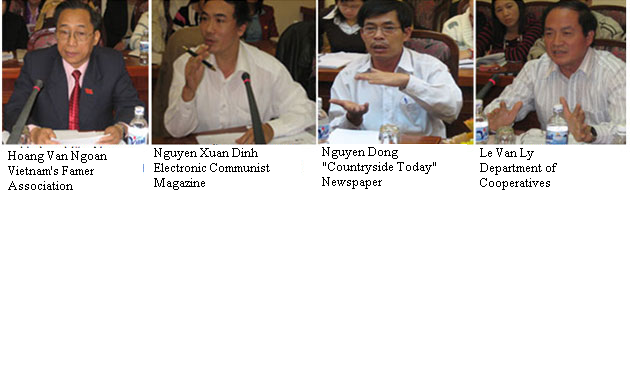The workshop was chaired by Vice-Minister of MARD Ho Xuan Hung and attended by delegates representing for state bodies (Ministry of Planning and Investment (MPI) and Ministry of Labor, Invalid and Social Affairs (MOLISA), scientific research institutes (Vietnames Academy of Social Sciences, Institute of Sociology, Institute of Research and Development etc.) and Vietnam’s Farmer Association. The workshop was also participated by journalists from mass media agencies such as Vietnam Television, Nhan Dan (People) Newspaper, Electronic Communist Magazine, Thanh Nien (Youth) Newspaper, Tien Phong (Advance) Newspaper and Sai Gon Giai Phong (Sai Gon Liberation) Newspaper…
The issues relating to agriculture and rural have been so far under extensive discussion but this workshop was considered as a first opportunity for delegates to deeply discuss on “farmers” who play a key role in Vietnam’s rural society today and the matters that farmers are facing in the process of developing market economy, industrialization, modernization and international economy integration.
This was also the first time different comments and points of view on the mentioned topics were raised and discussed. At the workshop, researchers and policy analysts had opportunity to discuss in a straightforward manner with managers and policy makers. The social aspects on agriculture and rural and farmers were discussed among social and economic specialists. Delegates of policy research and analysis bodies of private sector also had direct dialogues with delegates of public research institutions…
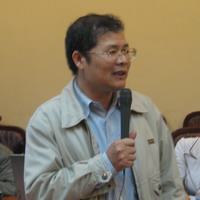 |
| Dr. Do Thien Kinh (IOS) |
Concerning to the current inequality in accessing opportunities, Dr. Do Thien Kinh who come from Institute of Sociology (IOS) said that the social inequality in Vietnam “is certainly not only at an acceptable level, but also higher than other countries in the region and the world” especially when we studied further the gaps between urban and rural or between Kinh/Hoa people and other ethnic minorities. It is certain that the picture of Vietnam’s rural society still contains with a number of unstable factors.
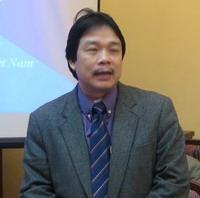 |
| Dr. Dang Nguyen Anh (VASS) |
As impacted by rapid but uneven urbanization, the rural-to-urban migration has become “a strategy that not only help people escape from poor but also promote rural development”, Dr. Dang Nguyen Anh who come from Vietnamese Academy of Social Sciences suggested. “While poverty is stimulating migration, the migration itself helps promote poverty alleviation in the departing regions”. Despite its current important role, migration policy has had insufficient points, especially on population component classification. This has resulted in great differences in accessing social services and opportunities by various groups (four groups: KT1, KT2, KT3, KT4). In the eye of the society, people migrating from rural to urban regions are considered as those who cause social instability and worsen the beauty of urban regions…regardless the active role they play in economic structure transformation as well as agriculture and rural development. It is clear that we still lack policy that can provide social support to the migrants.
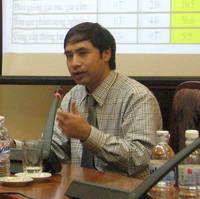 |
| Dr. Vu Trong Binh (IPSARD) |
In the angle of social classification, based on the current practices and actual situations of different localities, Dr. Vu Trong Binh who come from RUDEC of IPSARD clarified the rural social classification process and highlighted the need of upgrading the existing agriculture and rural development policy. The development of market economy in combination with the development of social groups should be based on actual demand of rural population and suitable level of governmental intervention. According to his opinion, this was considered as a major step that could enhance the sustainable rural development.
 |
| Dr. Nguyen Ngoc Que (IPSARD) |
In the angle of economy, Dr. Nguyen Ngoc Que, who come from CAP of IPSARD said that since 1999, pricing has been causing a lot of problems to agricultural producers. The loss of agricultural land basically has stemmed from poor land-use planning while agricultural and rural laborers lacked employment. These are main reasons that have lowered agricultural GDP and adversely affected physical lives of farmers.
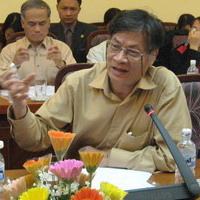 |
| Dr. Nguyen Quang A (IDS) |
Dr. Nguyen Quang A, who come from Institute of Research and Development expressed his consensus with view on rural-urban migration as suggested by Dr. Dang Nguyen Anh and added “If we have policies that could help remove legal and psychological barriers for migrants, it is possible that we can create a “great” change to our country’s industrialization, modernization and urbanization and avoid the “deadly traps” as ever encountered by developing and developed nations in the cause of agriculture and rural development.
 |
| Dr. Le Dang Doanh |
Dr. Le Dang Doanh, a senior economic expert said that policies should be implemented in order to create “a society of high transparency where people are free to select residing areas as well as employment and they should not be discriminated”. According to him, advance technology should be applied to streamline residential and identity cards management in order to put into full use the advantages brought back by migrants.
In his conclusion, Vice-Minister Ho Xuan Hung highly appreciated the results of the workshop and stressed on the need of creating more opportunities for organizations and individuals to exchange their views on matters of agriculture, farmer and rural along the country’s developmental process. The Vice-Minister also introduced to participants of the workshop the roadmap of formulating rural development strategy as handed-over by the government to MARD and IPSARD.
For more information on the workshop, please visit VietNamNet, Electronic Newspaper of Vietnam’s Communist Party and Thanh Nien Online...
